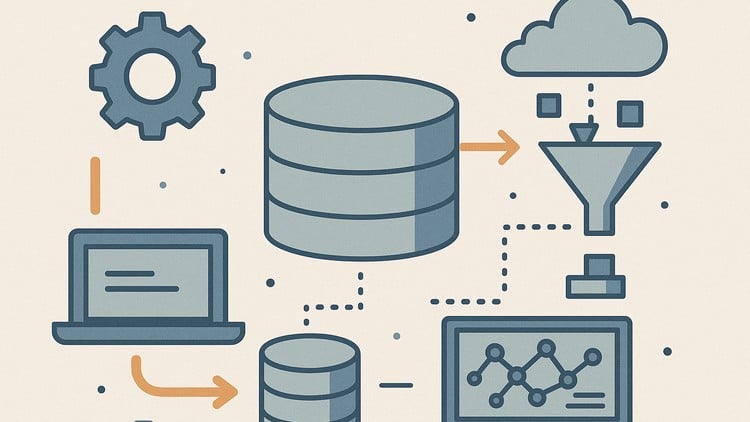
Master data pipelines, cloud platforms, and orchestration with hands-on labs & a career-focused curriculum.
⏱️ Length: 1.1 total hours
⭐ 4.27/5 rating
👥 4,854 students
🔄 September 2025 update
Add-On Information:
Note➛ Make sure your 𝐔𝐝𝐞𝐦𝐲 cart has only this course you're going to enroll it now, Remove all other courses from the 𝐔𝐝𝐞𝐦𝐲 cart before Enrolling!
-
Course Overview
- Dive into the foundational discipline of data engineering, establishing the bedrock for robust and scalable data infrastructures. This course illuminates the critical role data engineers play, acting as architects and custodians of an organization’s most valuable asset: its data.
- Explore the paradigm shift towards cloud-native solutions and big data processing, embracing elastic, highly available platforms. Understand architectural patterns for resilient data pipelines handling vast volumes of diverse data, whether batch-processed or streamed in real-time.
- Uncover the importance of data integrity, reliability, and accessibility. Learn to build systems that move data efficiently, ensuring quality and usability for downstream analytics and machine learning initiatives. This foundational journey equips you with strategic thinking for future-proof data solutions and prepares you to contribute meaningfully to data excellence.
-
Requirements / Prerequisites
- Basic Programming Acumen: A foundational understanding of programming logic, ideally with some exposure to Python, as it is the lingua franca for scripting, automation, and data manipulation in the data engineering ecosystem.
- Conceptual Database Knowledge: While advanced SQL skills are not required, a general grasp of what databases are, how they store information, and the concept of relational tables and queries will provide a solid starting point.
- Analytical Mindset: An eagerness to solve complex data challenges, optimize processes, and build efficient systems. Curiosity about how data flows and transforms will significantly enhance your learning experience.
- Comfort with Command Line Interface (CLI): Basic familiarity with navigating file systems, executing commands, and managing processes via a terminal, as many data engineering tasks involve command-line operations.
- No Prior Data Engineering Experience Required: This course is specifically designed for beginners or professionals looking to pivot into data engineering, providing a comprehensive introduction without assuming prior specialized knowledge in the field.
-
Skills Covered / Tools Used
- Cloud Computing Fundamentals: Grasp core cloud services like object storage (e.g., S3), virtual machines, serverless functions, and managed databases, understanding their role in scalable data architectures.
- Distributed Data Storage: Learn principles of scalable, fault-tolerant data storage, including data lakes for unstructured data and various big data storage paradigms.
- Big Data Processing Concepts: Understand fundamentals of large-scale data processing: parallel computation, distributed file systems, and the map-reduce paradigm, foundational for tools like Spark/Hadoop.
- Version Control (Git): Master essential Git commands for collaborative code development, branching, merging, and maintaining robust history.
- Containerization (Docker): Utilize Docker to package data applications and dependencies into portable, consistent environments for streamlined deployment.
- Workflow Orchestration Concepts: Explore principles of scheduling, monitoring, and managing complex data workflows using Directed Acyclic Graphs (DAGs) for automated pipeline execution.
- Monitoring & Logging: Implement basic monitoring and logging strategies for data pipelines to ensure operational visibility, troubleshoot issues, and identify anomalies.
- Data Modeling for Analytics: Design data models optimized for analytical queries, including dimensional modeling (star/snowflake schemas) and denormalization for efficient reporting.
- API Data Ingestion: Learn programmatic interaction with APIs (RESTful, GraphQL) to extract data from external sources, populating data lakes and warehouses.
-
Benefits / Outcomes
- Launch Data Engineering Career: Acquire foundational knowledge and practical skills for entry-level junior data engineer roles, building a strong understanding portfolio.
- Build End-to-End Data Solutions: Develop capability to conceptualize, design, and contribute to complete data pipelines, from raw source to consumable insight.
- Navigate Cloud Ecosystems: Gain confidence in leveraging fundamental cloud services for data storage, processing, and compute, adaptable to various cloud provider environments.
- Contribute to Data-Driven Initiatives: Become invaluable, enabling efficient data access and reliable data products supporting business intelligence, analytics, and machine learning.
- Problem-Solving for Data Challenges: Cultivate a robust methodology tailored to data issues, empowering you to debug, optimize, and enhance data workflows.
- Establish Strong Conceptual Framework: Build a durable mental model of modern data engineering principles, allowing quick adaptation to evolving data landscapes.
-
PROS
- Hands-On Learning Experience: The course emphasizes practical application through labs, reinforcing theoretical concepts with real-world scenarios.
- Career-Oriented Curriculum: Specifically designed to align with industry demands, preparing learners for actual data engineering roles.
- Foundational for Advanced Topics: Provides a robust understanding of core concepts, serving as an excellent springboard for more specialized or advanced data engineering studies.
- Exposure to Modern Tools & Concepts: Introduces you to the essential technologies and architectural patterns prevalent in contemporary data systems.
- Efficient Skill Acquisition: Structured to deliver maximum impact in a concise timeframe, focusing on key actionable knowledge.
-
CONS
- Requires Proactive Engagement for Mastery: While foundational, truly mastering the wide array of concepts and tools will necessitate significant practice and continuous self-study beyond the course material.
Learning Tracks: English,Development,Data Science
Found It Free? Share It Fast!